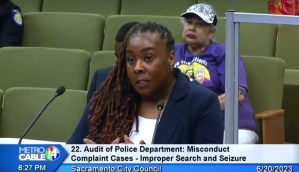By Robert J. Hansen,
The Sacramento Observer
While trying to make a public comment at the June 20 Sacramento City Council meeting, Samuel Kinsey broke down in tears after watching a video in which a 10-year-old Black girl was put in handcuffs by a Sacramento police officer.
“We are hurting,” a woman said while comforting Kinsey.
The video of Sacramento police handcuffing the crying 10-year-old girl was presented by the Office of Public Safety Accountability (OPSA) to the City Council among its findings in an audit of misconduct complaint cases in the Sacramento Police Department.
In the video, taken in February of last year, male officers conducting a probation search are seen screaming at people inside to open the door, grabbing and forcibly shaking the home’s metal screen.
OPSA Director Dr. LaTesha Watson said handcuffing the young girl was completely unnecessary. She confirmed in an interview that the officer was not reprimanded or disciplined because the police department said his actions were justified.
“One thing you have to pay attention to as a police leader is— yes, stuff can be justified— but was it necessary?” Watson said. “This was not necessary.”
Watson spoke with the child’s mother, who told her that because of that interaction her daughter is now afraid of the police.
“I do not want a child to be afraid of the police department. That is not our role,” Watson said. “I wish I would have been able to meet with her in person so that she could see that someone that looks like her is still in policing.”
Watson said if Black people continue to be treated this way, they will never want to be police officers.
OPSA Inspector General Dwight White said he believes race did play a factor in the handcuffing of the young Black girl.

“She should not have been handcuffed even for a second,” White said. “If this girl was another race, she likely would not have been handcuffed.”
The audit concluded that the child, who was handcuffed immediately upon the door opening, clearly posed no threat; that the incident was obviously traumatic to the child; and that it certainly will shape her view of police officers in the future.
A policy outlining procedures in dealing with minor children would benefit officers and lead to fewer traumatized children in the future, OPSA recommended.
Mayor Darrell Steinberg said that if law enforcement and the community can’t agree that there is a systemic problem around race, the city is not going to have the opportunity to improve together.
“The audit is about race,” Steinberg said. “I’m sorry, that’s what it’s about.”
Steinberg said there will be a time to discuss modern policing within the police department, but that the audit highlights a racial problem when it comes to search and seizure.
“I think we can all agree that no matter our opinion on law enforcement … no one should have their constitutional rights violated,” Steinberg said.
Chief Kathy Lester agreed with parts of the audit and provided helpful recommendations. She disagreed, however, that racial bias in search and seizures is systemic.
OPSA reviewed 109 complaints of SPD complaints of misconduct between 2020-2022. OPSA determined that 38 of the 109 completed misconduct complaint cases reviewed contained Fourth Amendment violations.

Lester said highlighting 109 audited complaints among 770,000 encounters her officers had with the public last year does not support allegations of improper conduct.
Councilmember Mai Vang pushed Chief Lester on that.
“If we can’t acknowledge the inequalities in our system, we will have already failed,” Vang said.
Chief Lester responded by saying, “I think there’s bias throughout the community. Certainly, if it occurs in the community it’s going to occur within the department.”
Mayor Steinberg stressed the importance of implementing the recommended policies, citing a recent California Department of Justice report on SPD.
“Unless an investigation resulted in a discipline recommendation, less than half of SPD’s investigative case files contained a detailed narrative of the allegations in the evidence gathered,” Steinberg said to Chief Lester. “I take it you’re working with [OPSA] on this?”
Iysha Jenkins with African American Employees Leadership Council said the audit’s findings demand immediate attention and action.
“This report is consistent with the lack of support Black city employees receive,” Jenkins said. “Serious issues exist within some of the city’s departments including the police department and fire department. OPSA’s audit exposes this behavior.”
OPSA’s audit also found that the largest proportion of completed misconduct complaint cases with sustainable Fourth Amendment violations arose from improper searches and seizures related to cell phones, unlawful detention during traffic stops, unlawful pat-downs and unlawful warrantless residential searches.
More than half the complaints of improper search and seizure received during the review period stemmed from traffic stops.
SPD does not have a current policy on the Fourth Amendment including search and seizure.
According to the audit, SPD’s search and seizure manual from 2007 needs to be updated, as it only generically describes search and seizure issues.
“It is unclear how SPD distinguishes a manual from a policy,” the audit said.
This is significant because the United States Supreme Court, federal district court and California state courts have issued several significant decisions pertaining to the Fourth Amendment since 2007.
The audit found multiple examples of allegations of improper search and seizure that progressed through several levels of SPD supervision without recognition of Fourth Amendment violations.
Stops based on minor traffic infractions with no apparent intent to enforce the infraction or ticket the driver become pretextual stops, according to the audit. The traffic stop can become unlawful if it is unnecessarily prolonged for a matter unrelated to the purpose of the stop.
Such pretext stops can deteriorate relationships within the community between citizens and the police, OPSA said.
The audit found every complaint regarding the conduct of traffic stops for illegal window tint was filed by a Black or Latino driver.
The audit also included the following recommendations:
SPD should require officers’ reports to articulate why they stopped a citizen and/or why they felt the need to pat down the person.
The department should establish a clear, detailed policy on pat-downs, investigatory stops and investigative detentions.
SPD should provide training to new recruits and police officers on investigatory stops, pat-downs, reasonable suspicion and Fourth Amendment fundamentals.
This article was originally published by the Sacramento Observer.
The post Audit of Sacramento Police Department reveals cuffing of 10-Year-Old Black girl during probation search appeared first on AFRO American Newspapers .











